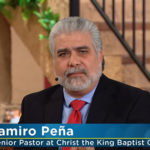Posted: 11/23/07
| Nabath Atusasire visits with a Words of Hope client outside his home. Atusasire often must hike up steep walking paths to isolated areas to reach the homes of his clients. Once he's there, he talks about living a healthy lifestyle, offers mosquito nets and shares about God's forgiveness. (IMB photos by Sue Sprenkle) |
Ugandan Baptist pastor
counsels people with AIDS
By Sue Sprenkle
International Mission Board
MBARARA, Uganda (BP)—Dressed in a suit coat and tie, Nabath Atusasire looks a little out of place as he picks his way through an overgrown banana grove.
The humid heat of southern Uganda presses on him. Slick-soled dress shoes provide little traction as the Baptist pastor treks along a well-worn, rocky path to an isolated village. He yells a greeting to a young woman as she walks out of a crumbling, mud home.
Atusasire came to counsel her husband who recently tested positive for HIV at the clinic where Atusasire works, but the woman asks him to pray for her. She says she is also sick.
 |
| Nabath Atusasire teaches a Bible lesson to some clients from the HIV clinic where he works. With the Baptist program Words of Hope, Ugandans go to homes and sit down to visit. "It's a more cultural way of doing things," Atusasire said. "We sit and visit and find out how our clients are really doing. We don't promise them anything but a listening ear." |
A wave of concern passes across the young pastor’s face as he realizes she too is most likely HIV-positive.
“It is like this in Uganda,” Atusasire stated matter-of-factly. In this country where more than 1 million out of 24 million people live with HIV, “Husbands don’t tell wives and wives don’t tell husbands … everyday someone finds out they are HIV-positive. This is a problem that affects everyone, whether you have it or not.”
Atusasire has lived with the effects of the disease his entire life. Born in the 1970s—the same decade AIDS appeared in the African nation—he remembers watching family members waste away and eventually die.
“They died off like mosquitoes,” Atusasire recounted, snapping his fingers repeatedly for emphasis. “Like mosquitoes, I tell you.”
He lost more than 20 relatives to the disease; seven aunts and uncles died the same year.
Back then, no one talked about AIDS. It was kept hidden. Now more than 30 years later, AIDS has made its way into every Ugandan household.
Atusasire doesn’t have to look farther than the children around his breakfast table to see how the pandemic can affect a family. Every morning 18 freshly scrubbed faces smile back at him. Only four of the children were born to him and his wife, Esther. The others are AIDS orphans
“I don’t really know how we ended up with so many kids,” the softhearted Atusasire said as Esther rolled her eyes affectionately at his statement.
The pastor met some of them through his counseling job with a Baptist HIV program called Words of Hope. Still others found their way to this home through members of his congregation or the community.
Every orphan has a tale of hardship. Some carry the pain of watching a beloved parent or relative suffer and die while others were ostracized by their village. Some villagers believe AIDS orphans spread the disease. Still others were treated like slaves, doing the work of adults during the day, forced to sleep with the chickens at night.
“Part of our ministry is to love children who think they do not have hope,” Esther Atusasire said. “We want to give them hope and a good family life.”
Offering hope to those who feel there is none is what Atusasire enjoys most. Whether playing with his children or counseling an HIV-positive client, the pastor’s goal is to show Christ’s compassion and forgiveness.
He points out that when people learn they have HIV, most have feelings of guilt and anger. Like the husband he hiked up a mountain to counsel, many are afraid to tell their spouse. They fear they will be left to die alone, ostracized by their village for having the disease.
“It is the way of Uganda,” the pastor said with a shrug. “Everyone knows about HIV/AIDS and it touches everyone’s life, but when it comes to you personally, most do not want to disclose.
“They fear death. They fear the reactions of their family and friends,” he said. “They fear for the future and lament about the past.”
As a counselor, Atusasire encourages people to talk about those fears.
“We sit and give them words of hope,” he said. “We tell them of a God who forgives and takes away our fears.”
Atusasire knows all too well that one of the most important steps in beginning to live with HIV/AIDS is forgiveness—accepting God’s forgiveness and forgiving those who brought the disease into your life.
“Once you experience this forgiveness,” Atusasire said, “the fears go away as you live a new life in Christ.”














We seek to connect God’s story and God’s people around the world. To learn more about God’s story, click here.
Send comments and feedback to Eric Black, our editor. For comments to be published, please specify “letter to the editor.” Maximum length for publication is 300 words.